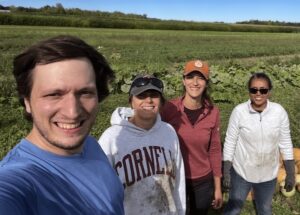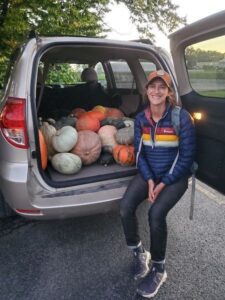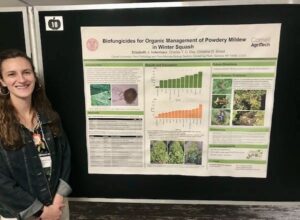
Members of the Smart Lab harvesting one of the CucCAP2 squash trials in 2022.
Libby Indermaur has been a member of the CucCAP Integrated Crop and Disease Management team first as an undergraduate student in the Schultheis Lab at NC State University and now as a PhD student in the Smart Lab at Cornell University.
What is your Hometown?
Raleigh, N.C.
What is the name of your institution and academic department or section?
Cornell University, Plant Pathology and Plant-Microbe Biology
What is your position? What type of degree program are you enrolled in?
Graduate Student – PhD candidate
Who are your major professor & members of your committee?
Major professor: Chris Smart; Committee Members: Kathie Hodge, Sarah Pethybridge, and Steve Reiners.
What is the focus of your work?
Plant pathology including pathogen biology, host resistance, and disease management practices.

Libby with a car full of squash harvested in 2022.
Introduce yourself—your background, where you are now, and your current research focus.
I’m originally from Raleigh, NC where I studied Horticultural Science and Plant Biology at North Carolina State University. I’m currently a 3rd year PhD student studying Plant Pathology at Cornell University with a focus on the biology and management of two fungal diseases: cucurbit powdery mildew on winter squash and Didymella leaf spot on rhubarb.
Why did you choose to work with Cucurbits, plant breeding, plant pathology, genomics, horticulture, agricultural economics or crop production?
My original introduction to plant science research was through CucCAP1 as an undergraduate research assistant with Jonathan Schultheis at NC State. There I fell in love with Cucurbits, and while studying their traits and diversity I fell in love with their pathogens.
What do you hope to accomplish during your time working on the CucCAP grant, and what do you most look forward to in this position?
I hope to help identify disease resistant squash breeding lines as candidate replacements of susceptible industry standards. My involvement with the CucCAP grant spans several disciplines, and I’m excited to work with horticulturists, plant breeders, and food scientists to develop new squash varieties.
Please provide a brief description of your research.

Libby presenting a poster at Cucurbitaceae in October 2022
For CucCAP, I am identifying which of Michael Mazourek’s Cucurbita moschata and C. maxima breeding lines are: 1) resistant to powdery mildew and 2) candidate replacements for the susceptible cultivars used in the processing industry. I work with these breeding lines from seed to post-production, evaluating their performance in the field and their fruit as canned products.
What is your favorite pathogen?
My favorite pathogen is Didymella rhei, which causes leaf and petiole spots on rhubarb.
Do you have any social media handles that you want included?
